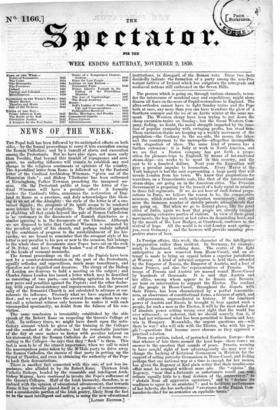• In Foreign affairs, this week, the character of the
intelligenoe ' is preparation rather than incident. In Germany, for example; much is threatened, nothing done. The centre of the fight anticipative is now removed from Hesse-Cassel, and an at- tempt is made to bring an appeal before a superior jurisdiction at Warsaw. A kind of informal congress is held there, attended by the Emperor of Russia, the Emperor of Austria, and a host of minor Princes, and also the' representatives of Prussia. The troops of Prussia and Austria are massed round Hesse-Cassel by hundreds of thousands. It is said that Austria and her allies, among whom appear to be Russia and Bavaria, are bent on intervention to support the Elector. The conduct , of the people in Hesse-Cassel, throughout the dispute with their Prince, has been characterized by a perfect reasonable- ness, an observance of constitutional forms, a fairness of spirit, and a self-possession, unprecedented in history. If the combined power of Austria and Russia be brought to bear against such a people, for such a man as the Elector, it will be the most naked act of absolute power setting wrong over right that the world has ever witnessed ; so indecent, that we should scarcely fear it, if we had not witnessed what has been permitted to Russia and Aus- tria in Hungary. Meanwhile, the urgent questions are—will there be war? who will side with the Elector, who with his peo- ,ple ?—questions that become more obscure as they approach a practical solution.
From one portion, indeed, of perturbed_ Northern Europe—from that whence of late there seemed the lest hope—there comes an answer to the question that sounds of peace. Prussia, seeming to have caught sight of how advantageously she may now ex- change the backing of historical Germanism in Holstein for the support of acting patriotic Germanism in Hesse-Cassel, and feeling perhaps that one national vier at a time is enough for her means, has given the Regency at Kiel plain notice that their troublesome affair must be arranged without more ado. She " enjoins" the Regency, "now that a fortunate or unfortunate result can con- tribute equally little to a final decision of the controversy," to " abstain from all aggressive operations," and to "declare its readiness to agree to an armistice " : and to facilitate performance of her behests, she has authorized. " overtures to the Danish Com- mander-in-chief for an armistice on equitable terms."


























